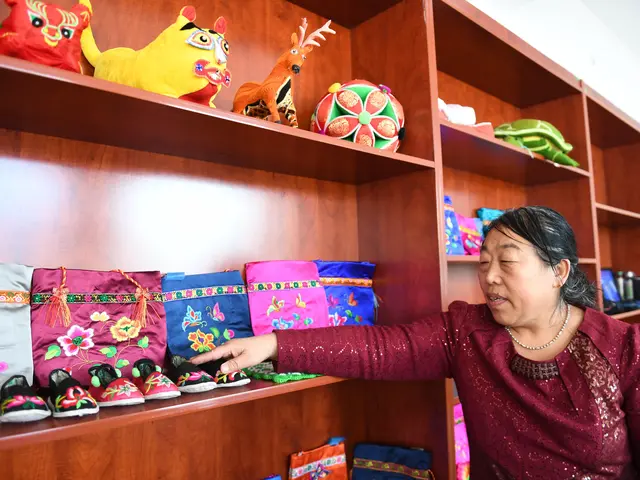After a long break for the Lunar New Year holiday, Wang Jinlian returned work, not in the embroidery workshop as she used to, but at home.
Wang, a poor villager from the prefecture-level Hinggan League, north China's Inner Mongolia Autonomous Region, is among the 1,000 farmers and herders hired by a local embroidery workshop as part of the region's poverty alleviation efforts.
While the outbreak of the novel coronavirus has affected the operation of the workshop, the embroiderers now start their stitchwork at home.
"We discuss the details over the phone, and have a special person to pick up our embroideries," she said, adding that they have to work overtime to finish an order worth 3 million yuan (430,000 U.S. dollars) on time.
By Tuesday morning, the Inner Mongolia Autonomous Region had no new reports of novel coronavirus cases for two weeks. The region lowered its emergency response on Feb. 25.
As positive signs start emerging in the battle against the epidemic, China is meticulously back on track in the anti-poverty fight as the country has targeted eradicating absolute poverty in 2020.
By the end of last year, there were still over 5.5 million people living under the poverty line across the country.
Yao Yongbo, director of the regional poverty alleviation office, said the epidemic hindered operations of more than 200 of the region's anti-poverty projects, affecting the incomes of more than 7,400 poor villagers.
"The projects, mostly labor-intensive businesses, were suspended because the employees were not allowed to gather in the workshops, and they also lacked raw materials and orders," Yao said.
He said the office had guided the businesses to solicit materials and orders online and organize online training for the poor villagers to prepare for the resumption of operation.
The local government also subsidized companies to ensure the provision of agricultural supplies for the upcoming spring plowing.
Bai Enze, manager of an agricultural company called Hexing, said with the support of the government, the company cut the prices of agricultural supplies by 15 percent and offered farmers free soil tests to optimize their fertilizer formula.
The company planned to raise the purchase price of corn by 40 yuan per tonne. In this way, every impoverished household would have an additional 1,600 yuan of income this year, Bai said.
Low-interest loans were provided to 184 major agricultural and husbandry companies, with the operation resumption rate of the major companies at the prefectural level or above reaching 70 percent, said Wang Yufeng, a spokesman with the regional agricultural and husbandry department.
Support was also emphasized for slaughtering, feedstuff, pesticide and agricultural products processing companies, Wang said.
"It is expected that the major companies will take a leading role in lifting impoverished people out of poverty," he said.
 简体中文
简体中文




